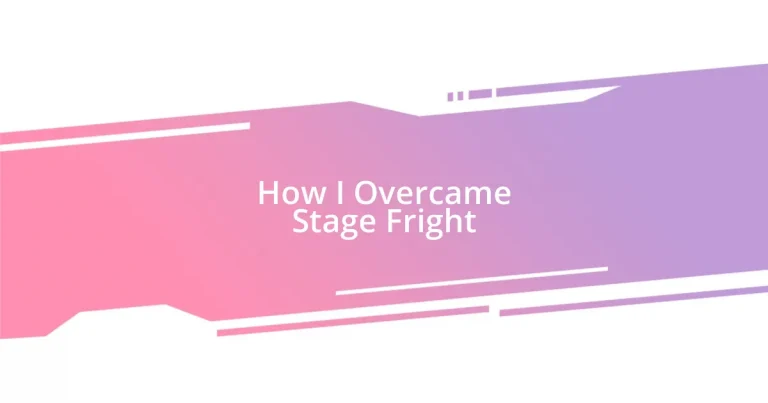Key takeaways:
- Stage fright is a common emotional response involving anxiety and fear, influenced by negative self-talk and past experiences.
- Effective techniques like diaphragmatic breathing, positive affirmations, and visualization help manage anxiety associated with public speaking.
- Gradual exposure to performing can build confidence, transforming anxiety into a sense of anticipation and connection.
- Seeking professional help, such as therapy or coaching, can provide valuable insights and strategies for overcoming stage fright.
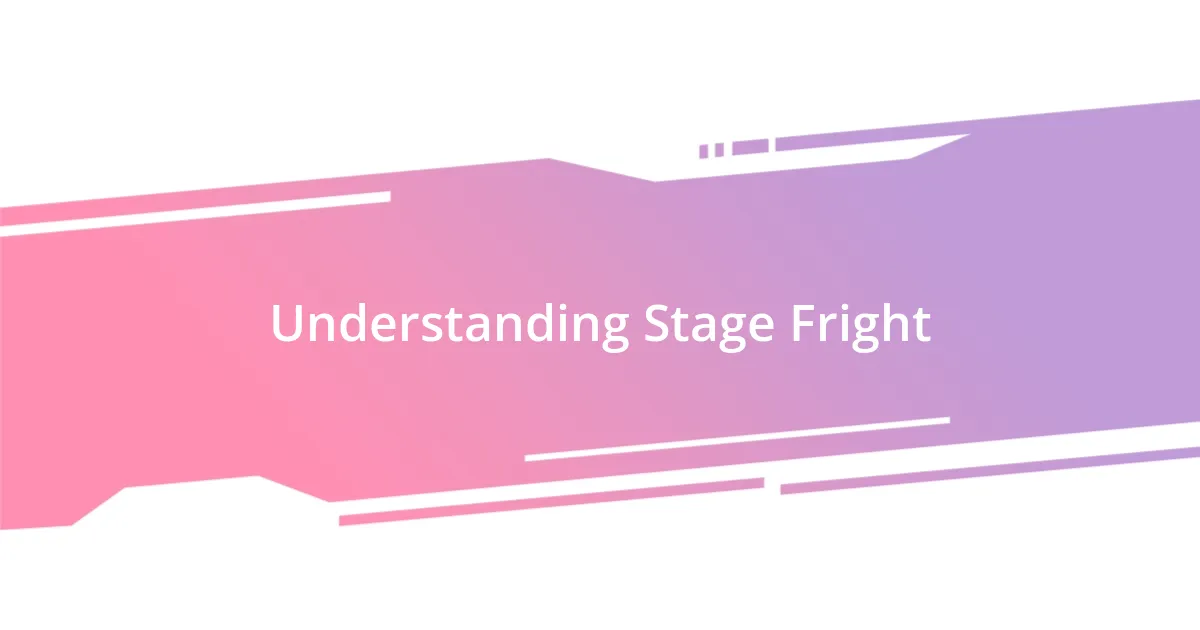
Understanding Stage Fright
Stage fright is an emotional response that many experience, combining anxiety, fear, and sometimes even a sense of vulnerability. I remember standing backstage, heart racing and palms sweaty, wondering if this would be the moment I stumbled over my words. Doesn’t that feeling resonate with you too—a mix of excitement and sheer terror?
It’s fascinating how our minds can play tricks on us. The fear of judgment often looms larger than the reality of the situation. I once found myself fixated on the person in the front row who seemed unimpressed, completely overlooking the supportive smiles around the room. Have you ever noticed how our focus can shift so dramatically, amplifying our fears?
Understanding stage fright means recognizing that it’s not just about being in front of an audience; it’s about confronting the insecurities that lie beneath the surface. I’ve had nights when the anxiety took such a toll that I questioned my abilities, yet those same experiences always taught me something valuable about resilience. Isn’t it intriguing how facing our fears can lead to profound personal growth?
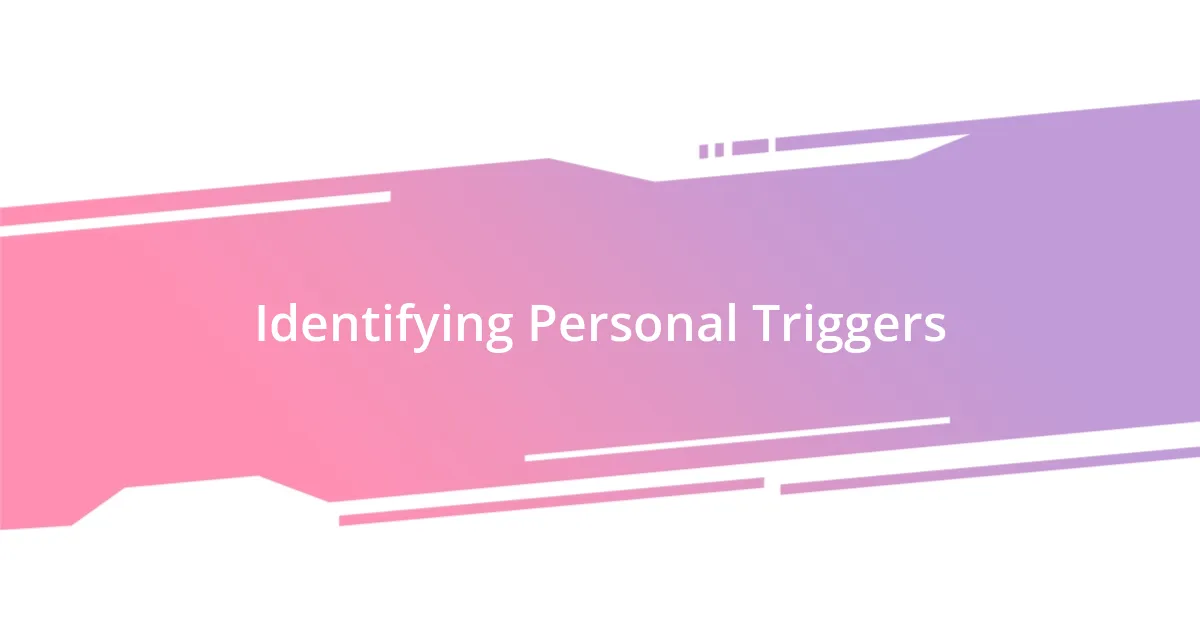
Identifying Personal Triggers
Identifying personal triggers is key to managing stage fright effectively. I’ve learned that triggers often lie hidden within our past experiences or even in the chatter of our own minds. For example, I realized that certain phrases like “You’ll mess it up” haunted me from a difficult presentation I had in high school. Recognizing this helped me put those fears into perspective.
Here are some common personal triggers to consider:
- Negative Self-Talk: I often found myself battling “What ifs” that spiraled into overwhelming fear.
- Crowd Composition: I noticed that speaking in front of a familiar crowd eased my anxiety, while a larger unfamiliar audience sparked it.
- Body Language of Others: If I perceived crossed arms or yawns, I’d automatically assume disinterest, triggering self-doubt.
- Past Failures: Recalling moments when I stumbled in front of an audience could send my anxiety into overdrive.
- Time Pressure: The countdown to my speaking slot often amplified my nervous energy, making me feel rushed.
By identifying these triggers, I learned to counteract them with positive affirmations or grounding techniques, transforming my fear into a manageable challenge.
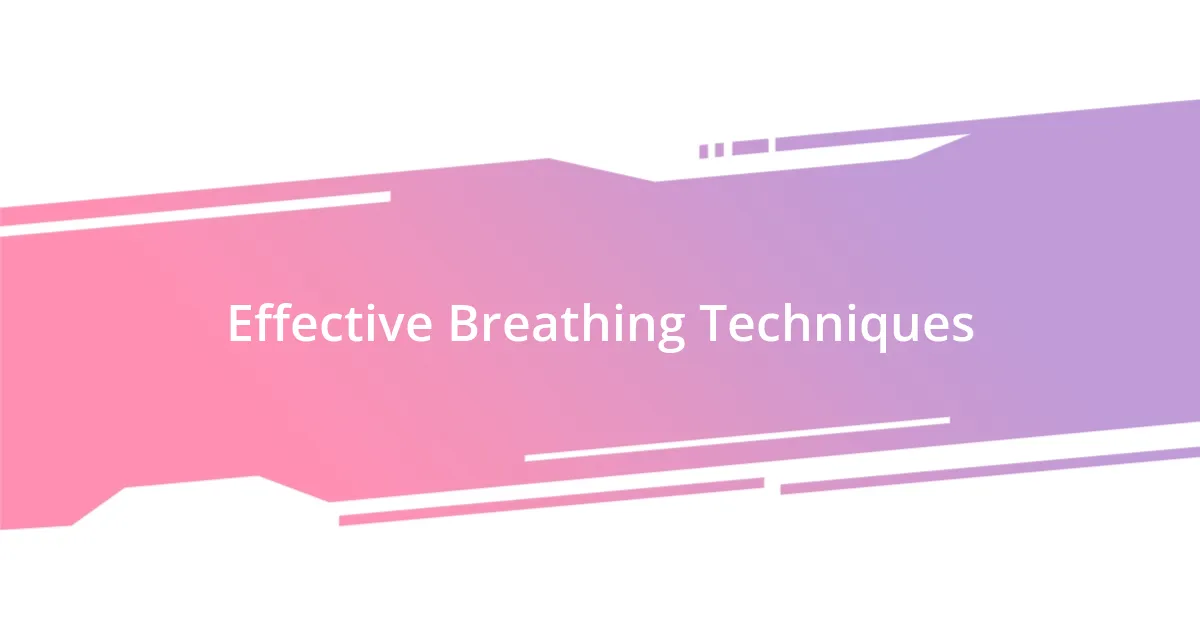
Effective Breathing Techniques
Effective breathing techniques can profoundly influence how we manage stage fright, and I’ve found different approaches to be effective at various times. One technique that stands out is diaphragmatic breathing. When I first tried this method, I was surprised by how simply placing my hand on my belly while inhaling deeply helped calm my racing heart. This practice activates the parasympathetic nervous system, promoting relaxation and enhancing focus. Have you ever noticed how your breath reflects your anxiety?
Another approach I’ve used is the 4-7-8 breathing technique. In moments of intense anxiety, like that time I was about to speak at a community event, I counted my breaths: inhaling for four seconds, holding for seven, and exhaling for eight. This shift in focus not only quieted my nerves but also gave me a clearer head. It’s incredible how intentional breathing can act as a reset button, creating a calm oasis amidst the chaos of stage fright.
Lastly, I’ve experimented with mindful breathing. This involves taking time before my performance to simply observe my breath, letting my thoughts come and go. I remember feeling overwhelmed before a meeting, but taking those few moments left me grounded and ready to engage. Each technique holds its unique place; exploring them can equip you with the tools you need when stage fright creeps in.
| Breathing Technique | Description |
|---|---|
| Diaphragmatic Breathing | Involves deep breaths with focus on expanding the belly; promotes relaxation and decreases anxiety. |
| 4-7-8 Breathing | Inhale for 4 seconds, hold for 7 seconds, exhale for 8 seconds; helps reset the nervous system. |
| Mindful Breathing | Observing and focusing on your breath to anchor yourself; promotes a sense of calm and clarity. |
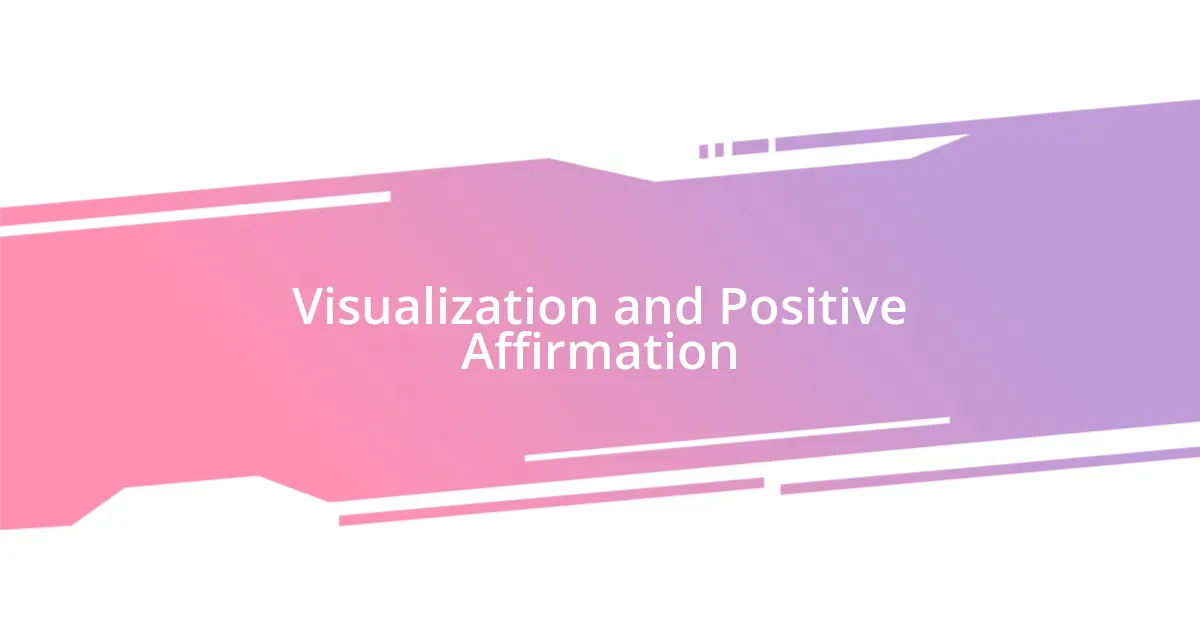
Visualization and Positive Affirmation
Visualization and positive affirmations became my trusted allies in overcoming stage fright. I vividly remember one particular instance before a big presentation; I closed my eyes and envisioned myself standing confidently before the audience, not just delivering my speech, but engaging with them. This mental rehearsal shifted my perspective, making me feel like I was already in control.
Incorporating positive affirmations into my routine was transformative too. I began each day with phrases like “I am prepared” and “I connect with my audience.” It’s interesting how simply saying these words out loud could inject a surge of confidence within me. Have you ever felt that rush of empowerment when you challenge negative thoughts with a positive twist? It’s a game changer.
Before stepping onto the stage, I’d take a moment to visualize my success and repeat affirmations to myself. One time, during a particularly nerve-wracking speech at a conference, I visualized not just myself speaking but the audience nodding and smiling back at me. That image became a warm blanket, helping me move past the anxiety. What I realized is that these techniques don’t erase fear completely but transform it into something manageable, almost like a supportive companion on stage rather than a daunting foe.

Gradual Exposure to Performing
Gradual exposure to performing played a crucial role in my journey to conquering stage fright. I still recall my first experience speaking in front of a small group of friends. My knees were shaking like leaves in the wind, but as I forced myself to share a silly story, I found that their supportive laughter melted away some of my fear. I think starting small is essential—each performance became a stepping stone that built my confidence.
As I progressed, I gradually increased the size of my audience. I remember when I went from speaking to friends to presenting at a local meetup. My heart raced, but the familiarity of the setting helped. Giving myself permission to feel nervous was liberating; I realized I didn’t have to be perfect. Isn’t it funny how we often believe we need to be flawless when, in reality, embracing imperfection can invite connection?
By the time I participated in a larger event, I felt a mix of excitement and apprehension. Sharing my journey on stage taught me that gradual exposure isn’t just about facing fear—it’s about discovering resilience. Each small step transformed my anxiety into a thrilling anticipation. I learned that with every performance, I wasn’t just overcoming fear; I was also uncovering a part of myself that thrived under the spotlight.

Seeking Professional Help
Seeking professional help can be a pivotal moment in overcoming stage fright. I remember the day I walked into a therapist’s office, feeling a mix of hope and anxiety. It was a leap of faith, but talking things through with someone experienced provided clarity and understanding. Have you thought about how a fresh perspective can sometimes unravel those tangled fears?
Therapy sessions became a safe space where I could explore my deepest fears without judgment. One particular exercise involved identifying the root of my anxiety. It was astonishing to unravel layers I hadn’t consciously acknowledged. Have you ever had that feeling of catharsis when you finally put a name to something that’s been bothering you? For me, it was like shedding a weight I didn’t even know I was carrying.
Additionally, working with a coach who specialized in public speaking offered practical strategies. I vividly remember our mock presentations; the constructive feedback turned my jitters into actionable improvements. These sessions energized me, as I learned specific techniques to manage my thoughts during performances. Isn’t it fascinating how professional guidance can turn fear into fuel for growth? That’s precisely what I experienced, transforming fear into an opportunity for progress.
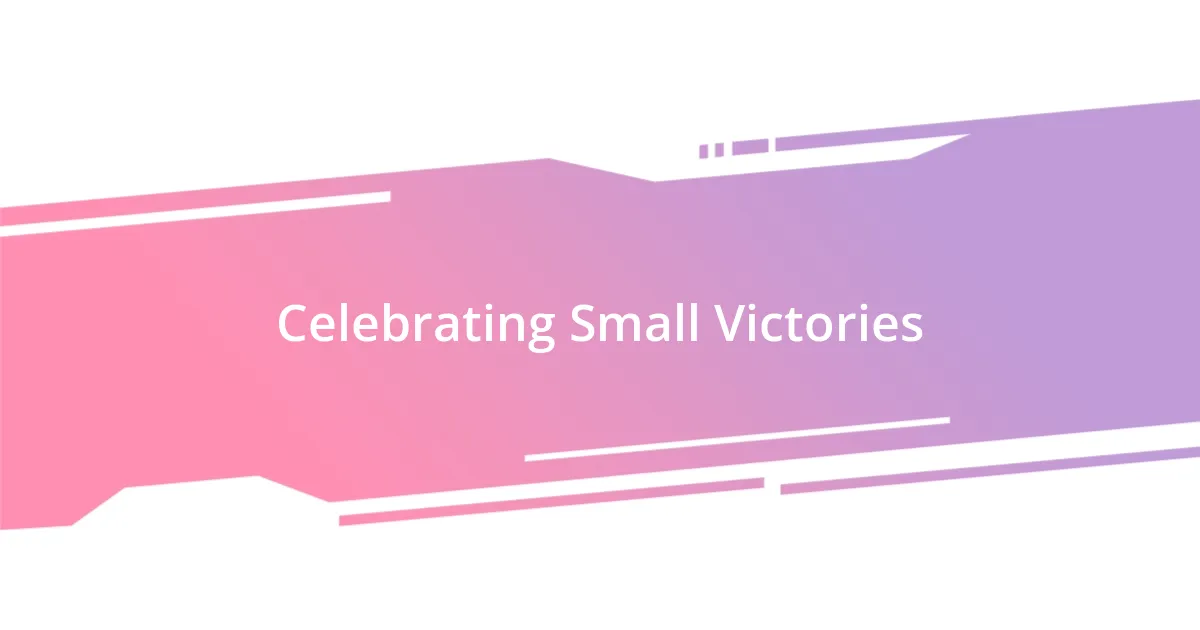
Celebrating Small Victories
Every step I took to conquer stage fright felt significant, even if it seemed small in the grand scheme of things. I remember the joy I felt after completing a brief presentation at work. My hands were still trembling as I stepped down from the podium, yet my colleagues’ applause wrapped around me like a warm blanket. That night, instead of focusing on the slight stumble I made, I celebrated the fact that I had shared my thoughts in front of others. It was a sweet victory that fueled my desire to keep pushing forward.
I still treat the minor wins as milestones on my journey. Recently, I shared my story during a community event—a far cry from my initial anxiety-ridden attempts. Standing there, after delivering my speech, I felt a surge of pride. Have you ever noticed how a simple “thank you” from someone can elevate your spirits? When one person approached me to say my story resonated with them, it reminded me that my victories matter, no matter their size. That connection made each nerve-wracking moment worth it.
Reflecting on these moments, I realize that celebrating small victories fosters resilience. I often jot them down in a journal, creating a tangible map of my progress. It’s fascinating how looking back at those entries can reignite the courage I felt at those moments. Do you keep track of your victories? I believe it’s essential—not just for motivation, but to visualize the journey from fear to confidence. In those reflections, I see not just personal growth but also the strength that emerges from embracing each small success.












